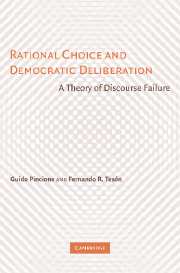Book contents
- Frontmatter
- Contents
- Preface
- Acknowledgments
- 1 Introduction
- 2 The Epistemic Argument for Deliberation
- 3 The Rational Choice Framework
- 4 The Resilience of Discourse Failure
- 5 Symbolism in Political Argument
- 6 Discourse Failure and Political Morality
- 7 Non-Epistemic Defenses of Deliberation
- 8 Deliberation, Consent, and Majority Rule
- 9 Overcoming Discourse Failure: Voluntary Communities
- Index
6 - Discourse Failure and Political Morality
Published online by Cambridge University Press: 05 May 2010
- Frontmatter
- Contents
- Preface
- Acknowledgments
- 1 Introduction
- 2 The Epistemic Argument for Deliberation
- 3 The Rational Choice Framework
- 4 The Resilience of Discourse Failure
- 5 Symbolism in Political Argument
- 6 Discourse Failure and Political Morality
- 7 Non-Epistemic Defenses of Deliberation
- 8 Deliberation, Consent, and Majority Rule
- 9 Overcoming Discourse Failure: Voluntary Communities
- Index
Summary
The Moral Turn
We have argued that theories of deliberative democracy are utopian because the mechanisms that generate discourse failure prevent citizens from deliberating in the manner recommended by deliberativists. This chapter explores and rejects a reply that deliberativists may offer to the charge of utopianism: that citizens who seem to ignore complex empirical matters involved in the choice of policies are really advancing moral positions to which such empirical matters are irrelevant. The argument (which we call “the moral turn”) runs as follows: Discourse failure affects only matters of fact. The public may ignore who the public officials are and how they behave, the mechanics of complex economic transactions, the functions of many institutions, and so forth. Political disagreement is, in contrast, primarily moral in character. Public debate on most political issues (regulatory policy, abortion, education, affirmative action, drug policy, euthanasia, and so forth) reflects a clash of values among different sectors of the citizenry. In deliberation, citizens try to clarify, refine, and correct moral views. Moral views are not affected by citizens' ignorance of complex factual issues because those views are normative. The idea is that moral principles tell citizens in a relatively straightforward way what policies they ought to support in the public forum. Because the most frequent and important political disagreements are moral in character, citizens may fruitfully deliberate even if they lack incentives to investigate complex matters of fact. On this view, positions that apparently evince empirical ignorance are just respectable moral positions.
- Type
- Chapter
- Information
- Rational Choice and Democratic DeliberationA Theory of Discourse Failure, pp. 142 - 182Publisher: Cambridge University PressPrint publication year: 2006



